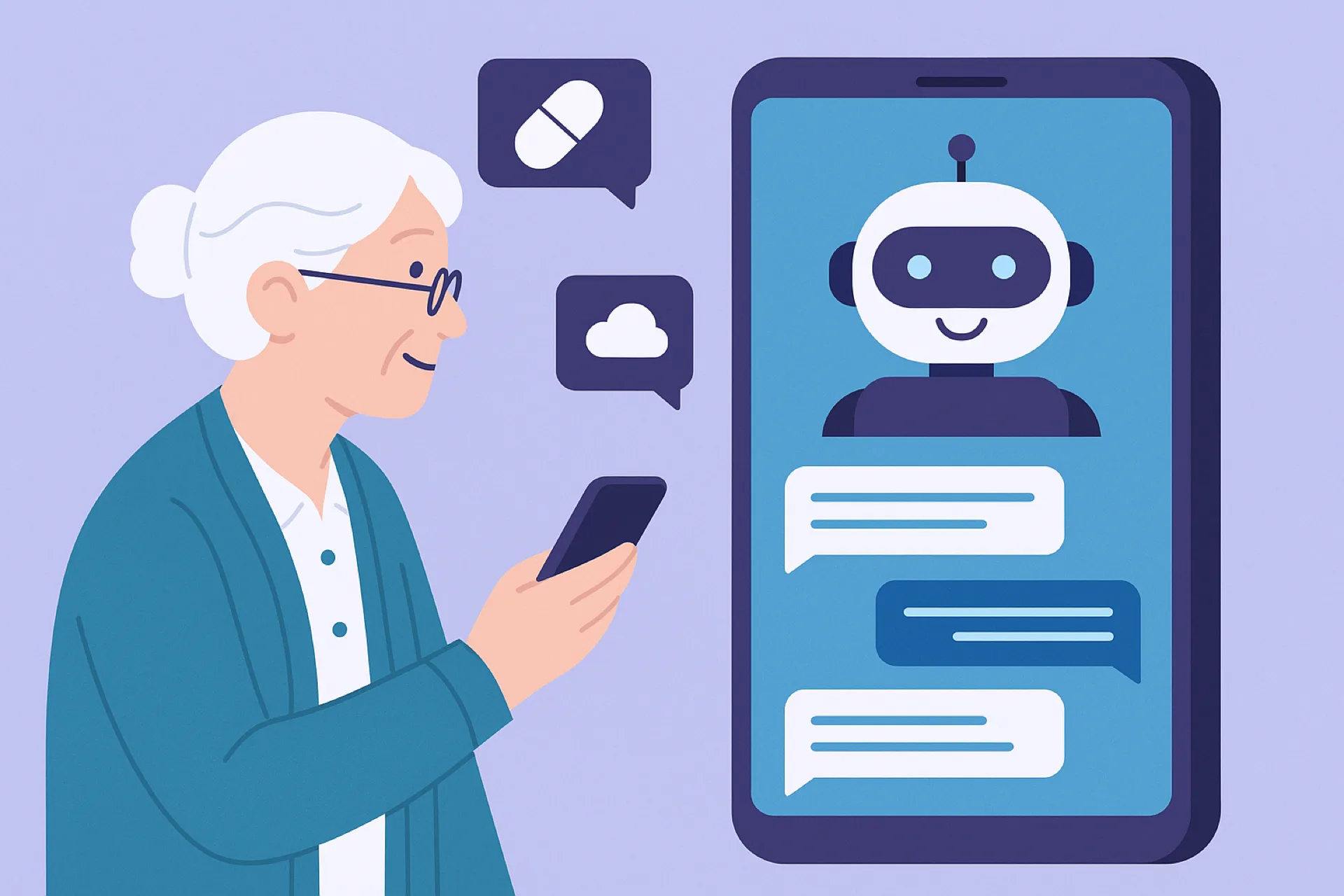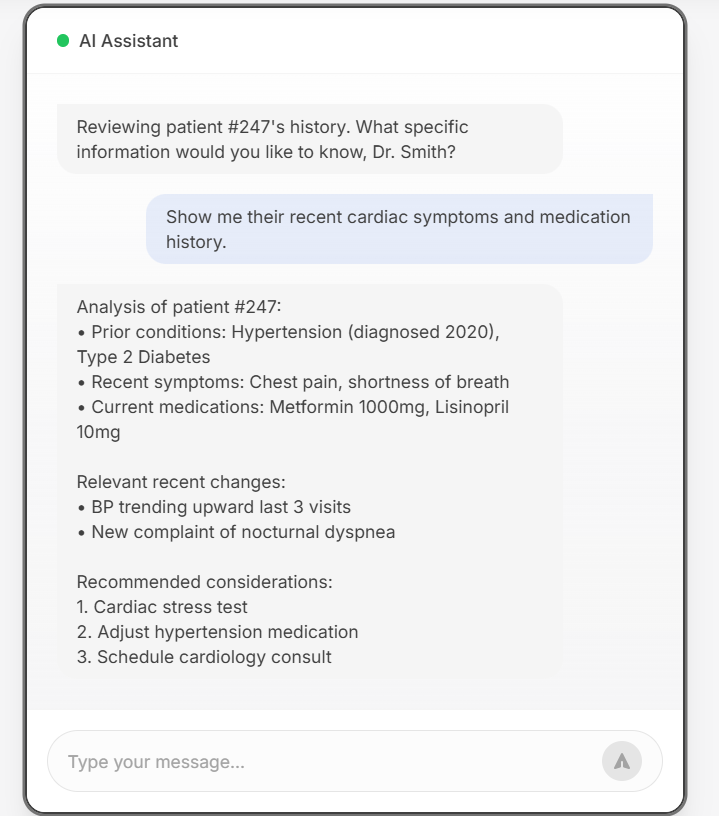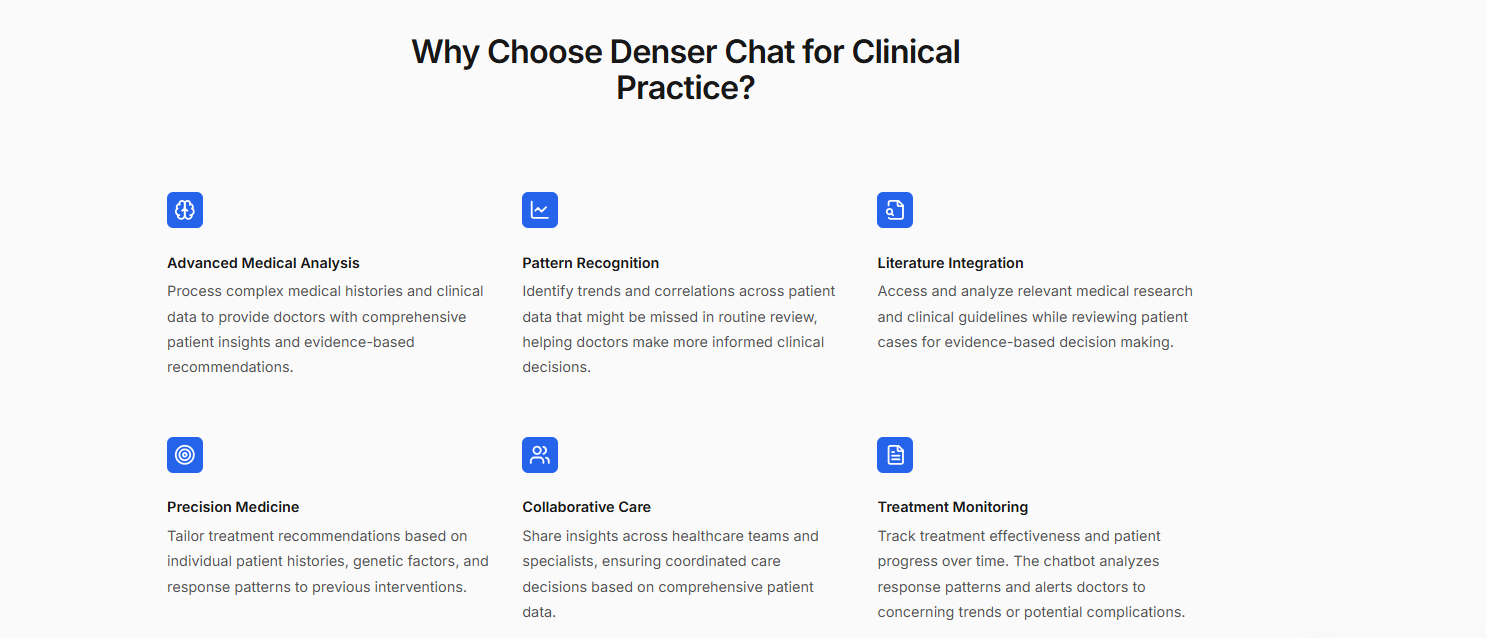
How AI Chatbots in Elderly Care Simplify Daily Monitoring

With nearly half of older adults now using the internet, it’s becoming easier to introduce technology that fits into their lives. As the demand for senior care grows, an AI healthcare chatbot helps fill the gaps when staff or family members aren’t always available.
Still, bringing AI into elderly care isn’t without its challenges. Some seniors aren’t comfortable with new tools, and caregivers may worry about privacy or reliability.
However, success depends on how you approach key aspects like training, setup, and ongoing education for staff and seniors.
In this article, we will look at the role of AI chatbots in elderly care, how to make them part of a care routine for independence, and how they might shape the future of taking care of seniors.
How AI Chatbots Understand and Respond to Senior Needs#
If you're running a senior living facility, in-home care service, or telehealth solution, you may have felt the pressure to offer consistent support while managing staff bandwidth.
Artificial intelligence (AI) chatbots help fill the need for consistent care by understanding how seniors communicate and respond in a way that feels reassuring.
Recognize Everyday Language#
AI agents for healthcare understand how people speak in real life. Natural language processing (NLP) can recognize what someone means even when the words are slow, repeated, or informal.
Most older adults may repeat themselves or ask the same questions in different ways. Chatbots are designed to follow along without getting confused. It helps you deliver a smoother experience that doesn’t feel robotic or scripted.
Learn From Past Interactions#
Chatbots don’t just respond in the moment. They also learn from what each user says over time. This is possible through AI technologies, which allow the system to adjust how it works based on past conversations.
If a senior often asks about their medication schedule or the weather at a specific time, the chatbot can learn to offer that information automatically. It’s a simple way to make the experience feel more personal and helpful without any extra work on your end.
It also means the chatbot becomes more useful the longer it’s in use. It begins to understand patterns and specific needs, which helps seniors get what they need faster and with less effort.
Offer Easy Ways to Interact#
Typing on a phone or reading small text can be difficult for many older adults. That’s why many AI chatbots include voice-based interaction. It lets them speak naturally instead of having to use a keyboard or touchscreen.
For your business, offering voice chat means you can support more seniors, including those who may struggle with mobility, eyesight, or tech comfort. It removes a barrier and creates a more inviting way to connect.
Pick Up on Emotional Cues#
Some chatbots can even detect signs of emotion. They do this by looking at the tone, choice of words, or sudden changes in how a person communicates.
If someone sounds upset or confused, the chatbot may prompt a caring response or flag the message for a follow-up.
This doesn’t replace a human caregiver, but it does help you notice when someone might need extra assistance. It’s a simple tool that can lead to quicker intervention and better care.
Deliver Personalized Care at Scale#
When chatbots understand language and context, they become more than just automated tools. They feel helpful, responsive, and even comforting.
Therefore, you can deliver personalized care to more people at once without increasing staff or resources.
Over time, the chatbot becomes a familiar voice for the senior and a reliable assistant for your team. It answers common questions, sends reminders, and even checks in, which gives you more time to focus on complex care needs.
Why AI Chatbots Are Becoming Essential in Elderly Care#
Caring for seniors takes patience and a dependable support system. As the aging population grows, many healthcare providers are under pressure to serve more people with limited staff.
Chatbots can help your team manage routine tasks, support older adults throughout the day, and fill the gaps when human assistance is unavailable.

If your business supports seniors through in-home services, assisted living, or virtual care, AI chatbots can help you raise the quality of support without increasing the workload.
Many seniors live alone or have family members who can’t be there full-time. AI chatbots help by acting as a steady presence. They can answer simple questions, provide reminders, and help with daily routines, all without needing your staff to be present at every moment.
This kind of support allows you to reach more people while maintaining the quality of care.
Use Cases of AI Chatbots in Elderly Care#
AI chatbots help manage daily schedules and create more personal connections for those who may feel isolated. If you’re looking to explore ways to strengthen your care services, these chatbot use cases can add real value.
Medication Management#
One of the most crucial tasks in elderly care is keeping up with medications. Missed doses can lead to serious health conditions.
AI chatbots help by sending regular reminders to take medicine at the right time. Seniors can also ask the chatbot if they have already taken their medication or when the next dose is due to prevent medication errors.
Routine Check-Ins and Wellness Prompts#
Chatbots can check in with users during the day. They can ask simple questions like “How are you feeling?” or “Did you have breakfast today?”
These prompts are helpful for tracking physical health and can alert staff if something seems off. Small interactions also can lead to quicker responses when someone needs more attention.
Scheduling and Appointment Support#
Seniors often need help remembering appointments or managing their lives. Chatbots can provide gentle reminders about doctor visits, physical therapy, or social events.
They can also confirm if transportation is arranged or notify staff when a senior has a question. This keeps everyone on the same page and cuts down on missed visits.
Mental Stimulation and Engagement#
Loneliness, dementia, and cognitive decline are common concerns among seniors. Some chatbots are designed to hold basic conversations, offer trivia questions, or even share uplifting stories or facts.
These moments of interaction can brighten someone’s day and provide mental exercise. While this does not replace human connection, it helps fill the quiet gaps in daily well-being.
Emergency Guidance and Alerts#
In urgent situations, a chatbot can guide seniors through what to do next. If someone says they feel chest pain, the chatbot can prompt them to call for help or trigger an alert to staff or loved ones.
These AI-powered features help ensure that no request is missed and that help arrives faster when needed. This use case is especially valuable if you're providing care for seniors living alone or with limitations.
Health Care Tracking and Symptom Reporting#
Chatbots can ask health-related questions and record responses. For example, seniors can report symptoms like dizziness, pain, or nausea. This health data can be sent to caregivers or nurses for review and used to better monitor health.
Support for Daily Tasks#
Seniors often need small reminders to stay on track, including prompts to drink water, eat lunch, or take a walk. The chatbot helps guide them through the day with gentle encouragement, giving them more structure and less confusion.
Can Older Adults Adapt to Conversational AI Easily?#
The idea of speaking to or typing into a virtual assistant might seem like a barrier for seniors, especially those who are not familiar with digital tools.
But even with that gap, the proper setup and support can help seniors adapt to AI chatbots and use them with comfort.
Over the past few years, more seniors have started using mobile phones, tablets, and even smart speakers. This growing use of voice tools shows that the idea of speaking to a chatbot is not as far off as it once seemed.
Chatbot design plays a big role in how well seniors adjust. Chatbots should guide one action at a time, using plain language that feels familiar. When the tool is focused and easy to follow, seniors don’t feel lost or overwhelmed.
The key is to start simple, offer patient support, and build from there. When introduced the right way, conversational AI tools can become a valuable part of how older adults manage their care and stay connected.
How Denser Supports Elderly Care Through AI Chatbots#
If your care model needs more than basic automation, Denser offers a deeper way to manage elderly support when clinical decisions and ongoing care coordination are part of your daily work.
Built for both healthcare professionals and care teams, Denserbot supports patient care, internal workflows, and ongoing health monitoring in a single system.
Brings Medical Information Together#
In senior care, you’re often working with fragmented data like past tests, prescriptions, symptom updates, and treatment plans. Denser helps pull that all into one view.
Denser gives you quick access to detailed information like lab results, notes, and prescription history, so you’re not bouncing between platforms or sorting through paperwork.
You can also filter out information that’s not related to the current issue to keep the interface clean and focused. It saves time and reduces the chance of missing something important.
Tracks Patterns Across Symptoms and Care History#
Denser uses deep learning to identify trends across a patient’s history. If an older adult has recurring symptoms, missed doses, or gaps in follow-up care, it can bring those patterns to your attention.

It helps your team step in earlier and stay ahead of potential risks. In elderly care, where small changes in health can signal larger challenges, this kind of support can lead to better outcomes.
Improves Everyday Clinical Decisions#
Every senior has a different set of health needs. Denser helps by comparing what you know about a patient with common care paths and medical guidelines.
It can flag risk areas, such as overlapping prescriptions or symptoms that need closer monitoring, and offer a summary to guide your next steps. This includes making sure proper medication adherence for patients with chronic conditions.
Keeps Communication Active and Clear#
Denser also handles regular follow-ups, reminders, and quick replies to patient questions through its chatbot interface. It helps your team provide companionship and support for daily activities, even between appointments.
That’s important for medication reminders, symptom tracking, and answering basic care questions, all of which can be time-consuming if handled manually.
Fits Into How You Already Work#
Many tools force you to change your workflow. Denser is built differently. You can create custom chatbot flows for tasks like symptom check-ins, medication reviews, or appointment follow-ups.
You can also use templates designed for everyday care needs, including fall risk assessments and fall detection response flows.
You stay in control of how data is stored and who has access. When a situation needs personal attention, the chatbot can escalate the case to a staff member or nurse. This balance between automation and human support helps reduce the burden on care teams.
Try Denser for free or schedule a product demo today!
How to Implement AI Chatbots in Elderly Care Settings#
Adding AI chatbots to your elderly care services can bring real value. Here’s a step-by-step guide to help you implement AI chatbots in a way that adds real value.
Build a Reliable Foundation#
The chatbot needs to know what matters most for each person in your care. You need to connect it to the systems you already use to manage health records, medication lists, appointment history, and caregiver notes.
With a complete view of someone’s background, the chatbot can respond in a way that makes sense. Instead of giving a generic answer, it can provide reminders, check ongoing concerns, and support personalized care without extra effort from your team.
Platforms like Denser allow this information to come together into one simple view. Therefore, less back-and-forth between files and more time focused on your patient.
A centralized structure is one of the key benefits of using chatbots in care environments.
Keep Data Safe and Workflows Stable#
Privacy is critical in elderly care. From daily conversations to health questions, older adults often share sensitive details that must be protected. The chatbot should be set up in a secure environment that respects this responsibility from the start.
With Denser, your care team can manage access to sensitive information and decide when a situation should be handed over to a human team member. The system runs securely, so residents and families feel confident that their information stays private.
At the same time, caregivers still get quick access to the updates they need, and no one is left waiting for answers.
Help Staff Make Informed Decisions#
Once the system is connected and secure, it becomes a reliable source of support for your staff. The chatbot can surface important patterns like missed doses, repeated symptoms, or changes in mood.
Rather than reading through pages of notes, your staff can get a quick overview that helps guide their next step. Denser also compares current health changes with known care plans, which offers summaries that help teams stay one step ahead without extra paperwork.
In elderly care, where even small shifts can mean a lot, having this kind of support leads to better decisions and stronger peace of mind. This type of insight strengthens caregiver knowledge and builds trust.
Keep the Process Familiar for Your Team#
New technologies like AI shouldn’t interrupt the way your team already delivers care. That’s why it helps to choose a chatbot system that works with the routines you’ve already built.
Denser lets you create custom chat flows that mirror how your caregivers check in with residents, track wellness, and share updates.
You don’t need to change how your team works. You just give them a new way to stay connected and supported.
Support Seniors and Staff Through Balanced Automation#
Older adults value connection. A chatbot should never get in the way of real relationships.
Its role is to support the care team by handling everyday tasks like reminders, check-ins, or scheduling, so your staff has more time for meaningful interaction. It improves the quality of life for seniors and lightens the load for caregivers.
When something feels off, the chatbot can alert the team. When something goes well, it helps reinforce a sense of structure and safety. When used this way, it becomes part of the rhythm of care.
Deliver Thoughtful Elderly Care With Denser’s AI Chatbots!#
If you’re looking for a better way to support older adults, Denser gives you the tools to do it with care.
Denser is built for elderly care, providing medication reminders, wellness check-ins, and helpful guidance throughout the day. The platform brings together health data, daily routines, and communication into one simple system.
Teams can create custom chatbot flows for symptom tracking, appointment updates, and emotional check-ins while keeping sensitive information protected. It fits into existing routines to help your staff stay informed and seniors feel supported.
If you're committed to creating a more responsive and compassionate care experience, Denser is a powerful step forward.

Try Denser for free or schedule a product demo today!
FAQs About AI Chatbots in Elderly Care#
How is AI used in elderly care?#
AI helps caregivers and older adults manage daily tasks more smoothly. It can remind seniors to take medicine, ask how they’re feeling, and give helpful updates like upcoming appointments.
AI also helps care teams keep track of changes in health so they can respond faster when something seems off. It’s used to support care and helps create more time for real human interaction, which is important as we see the increased use of tech in aged care.
How are AI chatbots used in healthcare?#
AI chatbots in healthcare are used to answer questions, collect health updates, and keep patients on schedule.
In elderly care, chatbots talk with seniors about how they’re doing, remind them to take medications, and alert staff if something seems wrong. They also give caregivers fast access to the information they need, helping them make better care decisions.
What is the best robot companion for the elderly?#
The best robot companion depends on what the person needs. Some are made to talk and keep seniors company, while others focus on care tasks like reminders and health tracking.
Many elderly care teams use AI chatbots because they’re easier to set up and don’t require a physical robot. These chatbots help with daily support and give seniors and staff an extra layer of connection.